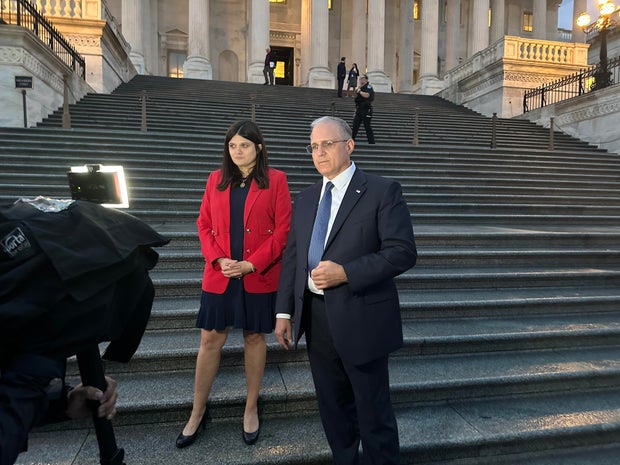/ CBS News
Paul Whelan’s lawyer discusses his release
Washington — Nearly seven weeks after the Russians handed over Paul Whelan on a tarmac in Ankara, Turkey, the Marine veteran stood on the steps of the U.S. Capitol with a message for other Americans who are held abroad.
“We’re coming for you,” he told reporters Tuesday night after he met with lawmakers. “It might take time, but we’re coming.”
Whelan said he spoke with lawmakers about how the government can better support detainees after they’re released.
“We spoke about how the next person’s experience could be better,” he said. “What the government could do for the next person that’s held hostage and comes home — the care and support that other people might need, especially people that are in a worse situation. There are people coming back that lived in the dirt without shoes for three years, people that were locked up in hideous conditions for 20 years. They need support.”

The U.S. secured Whelan’s release in August in one of the largest prisoner swaps since the end of the Cold War. The complex deal came after months of sensitive negotiations between the U.S., Russia, Germany, Slovenia, Poland and Norway.
As part of the deal, Russia released 16 prisoners while the Western countries released eight Russians. Whelan was released alongside Wall Street Journal reporter Evan Gershkovich, Russian-American radio journalist Alsu Kurmasheva and Vladimir Kara-Murza, a U.S. green card holder and Kremlin critic.
Whelan, who had been the longest-held American detainee in Russia, was arrested in December 2018 when he traveled to the country to attend a friend’s wedding. He was convicted of espionage in a secret trial and sentenced to 16 years in prison in 2020.
Whelan, his family and the U.S. government vehemently denied that he was a spy and accused Russia of using him as a political pawn. The U.S. government considered him to be wrongfully detained, a rare designation that put more government resources toward securing his release.
But a deal to secure his freedom was long elusive. He remained behind bars as Russia freed Marine veteran Trevor Reed and women’s basketball star Brittney Griner — both of whom were detained after Whelan’s arrest — in prisoner swaps with the U.S.
The U.S. said it pushed for his inclusion in both exchanges, but Russia refused. It led to Whelan advocating for his own release from a remote prison camp, calling government officials and journalists to make sure that he wasn’t forgotten.
When the plane carrying Whelan, Gershkovish and Kurmasheva landed in Maryland on Aug. 1, Whelan was the first to disembark. He was greeted by President Biden, who gave Whelan his American flag pin, and Vice President Kamala Harris.
“Whether he likes it or not, he changed the world,” Rep. Haley Stevens, a Michigan Democrat, told reporters Tuesday.
Whelan’s case and his family’s constant pressure on the U.S. government brought more attention to the cases of Americans who are wrongfully detained by foreign governments.
Haley said Whelan is a reminder to other Americans considering traveling to Russia that “you have a target on your back.”
Whelan said it’s been an adjustment acclimating to life back in the U.S., especially learning the latest technology like his iPhone 15.
“I was in a really remote part of Russia,” he said. “We really didn’t have much. The conditions were poor. The Russians said the poor conditions were part of the punishment. And coming back to see this sort of thing now is a bit of a shock, but it’s a good shock.”
- In:
- Paul Whelan
- Russia
Caitlin Yilek is a politics reporter at CBSNews.com, based in Washington, D.C. She previously worked for the Washington Examiner and The Hill, and was a member of the 2022 Paul Miller Washington Reporting Fellowship with the National Press Foundation.


